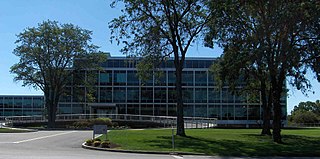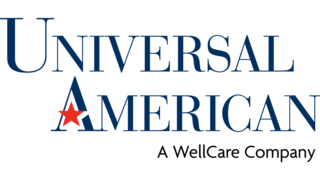Prescription drug list prices in the United States continually are among the highest in the world. The high cost of prescription drugs became a major topic of discussion in the 21st century, leading up to the American health care reform debate of 2009, and received renewed attention in 2015. One major reason for high prescription drug prices in the United States relative to other countries is the inability of government-granted monopolies in the American health care sector to use their bargaining power to negotiate lower prices, and the American payer ends up subsidizing the world's R&D spending on drugs.

The Cigna Group is an American multinational managed healthcare and insurance company based in Bloomfield, Connecticut. Its insurance subsidiaries are major providers of medical, dental, disability, life and accident insurance and related products and services, the majority of which are offered through employers and other groups. Cigna is incorporated in Delaware.
McKesson Corporation is a publicly-traded American company that distributes pharmaceuticals and provides health information technology, medical supplies, and health management tools. The company delivers a third of all pharmaceutical products used or consumed in North America and employs over 51,000 employees. With $308.9 billion in 2024 revenue, it is the ninth-largest company by revenue in the United States and the nation's largest health care company. The company is headquartered in Irving, Texas. It is a member of the S&P 500 and New York Stock Exchange, where it is traded under the ticker symbol NYSE: MCK.
Medco Health Solutions, Inc. was an American Pharmacy Benefits Management (PBM) company. Medco provided pharmacy services to private and public employers, health plans, labor unions, government agencies, and individuals served by Medicare Part D Prescription Drug Plans.
UnitedHealth Group Incorporated is an American multinational health insurance and services company based in Minnetonka, Minnesota. Selling insurance products under UnitedHealthcare, and health care services under the Optum brand, it is the world's ninth-largest company by revenue and the largest health care company by revenue.
Express Scripts Holding Company is a pharmacy benefit management (PBM) organization. In 2017 it was the 22nd-largest company in the United States by total revenue as well as the largest pharmacy benefit management (PBM) organization in the United States. Express Scripts had 2016 revenues of $100.752 billion. Since December 20, 2018, the company has been a direct subsidiary of Bloomfield, Connecticut-based Cigna.
CVS Caremark is the pharmacy benefit management subsidiary of CVS Health, headquartered in Woonsocket, Rhode Island.
In the United States, a pharmacy benefit manager (PBM) is a third-party administrator of prescription drug programs for commercial health plans, self-insured employer plans, Medicare Part D plans, the Federal Employees Health Benefits Program, and state government employee plans. PBMs operate inside of integrated healthcare systems, as part of retail pharmacies, and as part of insurance companies.
CVS Health Corporation is an American healthcare company that owns CVS Pharmacy, a retail pharmacy chain; CVS Caremark, a pharmacy benefits manager; and Aetna, a health insurance provider, among many other brands. The company is the world's second largest healthcare company, behind UnitedHealth Group. In 2023, the company was ranked 64th in the Forbes Global 2000.

First Databank (FDB) is a major provider of drug and medical device databases that help inform healthcare professionals to make decisions. FDB partners with information system developers to deliver useful medication- and medical device-related information to clinicians, business associates, and patients. FDB is part of Hearst and the Hearst Health network.
Electronic prescription is the computer-based electronic generation, transmission, and filling of a medical prescription, taking the place of paper and faxed prescriptions. E-prescribing allows a physician, physician assistant, pharmacist, or nurse practitioner to use digital prescription software to electronically transmit a new prescription or renewal authorization to a community or mail-order pharmacy. It outlines the ability to send error-free, accurate, and understandable prescriptions electronically from the healthcare provider to the pharmacy. E-prescribing is meant to reduce the risks associated with traditional prescription script writing. It is also one of the major reasons for the push for electronic medical records. By sharing medical prescription information, e-prescribing seeks to connect the patient's team of healthcare providers to facilitate knowledgeable decision making.

Universal American was a Fortune 500 company with offices throughout the United States, and headquarters in Rye Brook, New York. The company offered health insurance, and also deals in Medicare managed care plans, and Medicare prescription drug benefits. Its CEO is Richard A. Barasch.
Change Healthcare Inc. is a provider of revenue and payment cycle management that connects payers, providers, and patients within the U.S. healthcare system. The name also refers to a company founded in 2007 which subsequently became part of the current conglomerate. The company operates the largest financial and administrative information exchange in the United States.
EMIS Health, formerly known as Egton Medical Information Systems, supplies electronic patient record systems and software used in primary care, acute care and community pharmacy in the United Kingdom. The company is based in Leeds. It claims that more than half of GP practices across the UK use EMIS Health software and holds number one or two market positions in its main markets. In June 2022 the company was acquired by Bordeaux UK Holdings II Limited, an affiliate of UnitedHealth's Optum business for a 49% premium on EMIS's closing share price.
Specialty drugs or specialty pharmaceuticals are a recent designation of pharmaceuticals classified as high-cost, high complexity and/or high touch. Specialty drugs are often biologics—"drugs derived from living cells" that are injectable or infused. They are used to treat complex or rare chronic conditions such as cancer, rheumatoid arthritis, hemophilia, H.I.V. psoriasis, inflammatory bowel disease and hepatitis C. In 1990 there were 10 specialty drugs on the market, around five years later nearly 30, by 2008 200, and by 2015 300.
Specialty pharmacy refers to distribution channels designed to handle specialty drugs — pharmaceutical therapies that are either high cost, high complexity and/or high touch. High touch refers to higher degree of complexity in terms of distribution, administration, or patient management which drives up the cost of the drugs. In the early years specialty pharmacy providers attached "high-touch services to their overall price tags" arguing that patients who receive specialty pharmaceuticals "need high levels of ancillary and follow-up care to ensure that the drug spend is not wasted on them." An example of a specialty drug that would only be available through specialty pharmacy is interferon beta-1a (Avonex), a treatment for MS that requires a refrigerated chain of distribution and costs $17,000 a year. Some specialty pharmacies deal in pharmaceuticals that treat complex or rare chronic conditions such as cancer, rheumatoid arthritis, hemophilia, H.I.V. psoriasis, inflammatory bowel disease (IBD) or Hepatitis C. "Specialty pharmacies are seen as a reliable distribution channel for expensive drugs, offering patients convenience and lower costs while maximizing insurance reimbursements from those companies that cover the drug. Patients typically pay the same co-payments whether or not their insurers cover the drug." As the market demanded specialization in drug distribution and clinical management of complex therapies, specialized pharma (SP) evolved.„ Specialty pharmacies may handle therapies that are biologics, and are injectable or infused. By 2008 the pharmacy benefit management dominated the specialty pharmacies market having acquired smaller specialty pharmacies. PBMs administer specialty pharmacies in their network and can "negotiate better prices and frequently offer a complete menu of specialty pharmaceuticals and related services to serve as an attractive 'one-stop shop' for health plans and employers."
Diplomat Pharmacy, Inc. is the largest independent provider of specialty pharmacy services in the United States. The company partners with manufacturers, payers, providers, hospitals, and more. Headquartered in Flint, Michigan, Diplomat has facilities across the United States and dispenses drugs in all 50 states. Diplomat offers specialized medication and medication management programs for patients with complex and chronic conditions such as cancer, hepatitis, multiple sclerosis, HIV and others.
GoodRx Holdings, Inc., is an American healthcare company that operates a telemedicine platform and free-to-use website and mobile app that track prescription drug prices in the United States and provide drug coupons for discounts on medications. GoodRx checks drug prices at more than seventy-five thousand pharmacies in the United States. The platform allows individuals to consult with a doctor online and obtain a prescription for certain types of medications at a cost of US$20, regardless of insurance status. Medical testing services, which vary in price, are also offered through the platform.
Optum, Inc. is an American healthcare company that provides technology services, pharmacy care services and various direct healthcare services.
RXNT is an American privately held healthcare software technology company. The company provides ambulatory practices, hospitals, medical billers, and other healthcare professionals with digital health tools. The company was created in 1999, as a standalone e-prescribing system.


